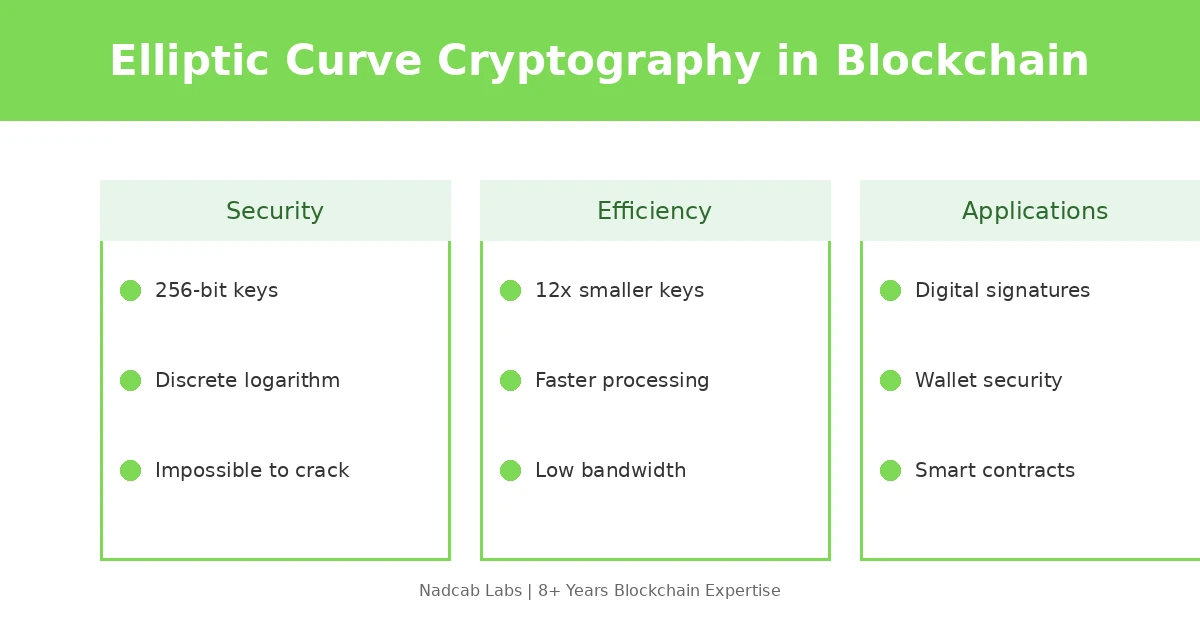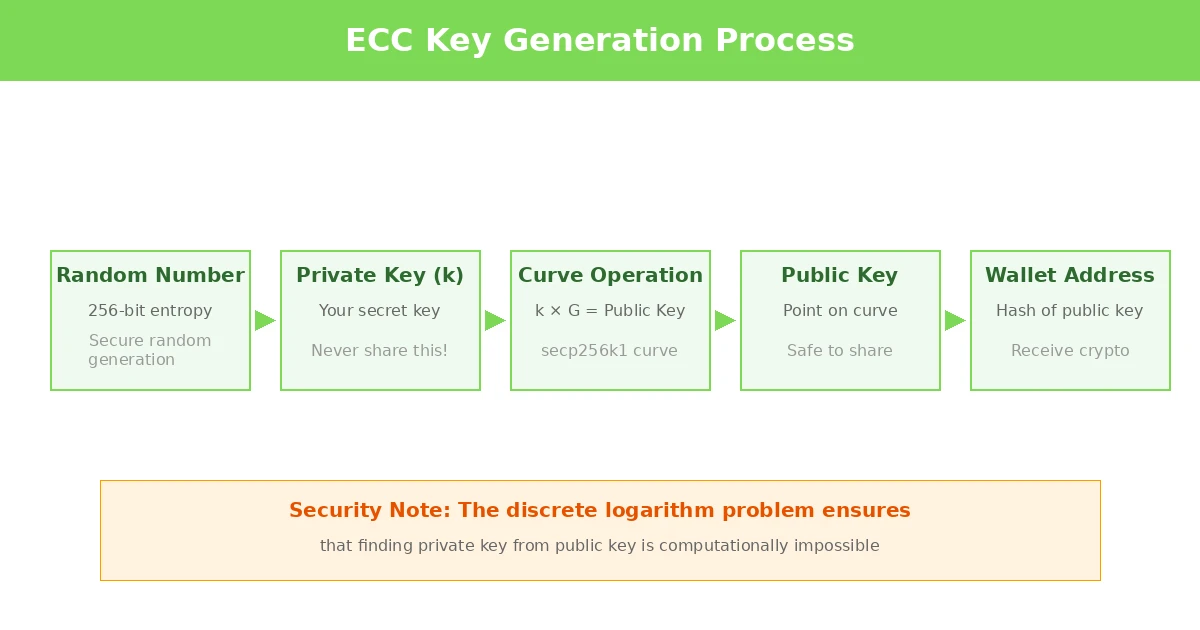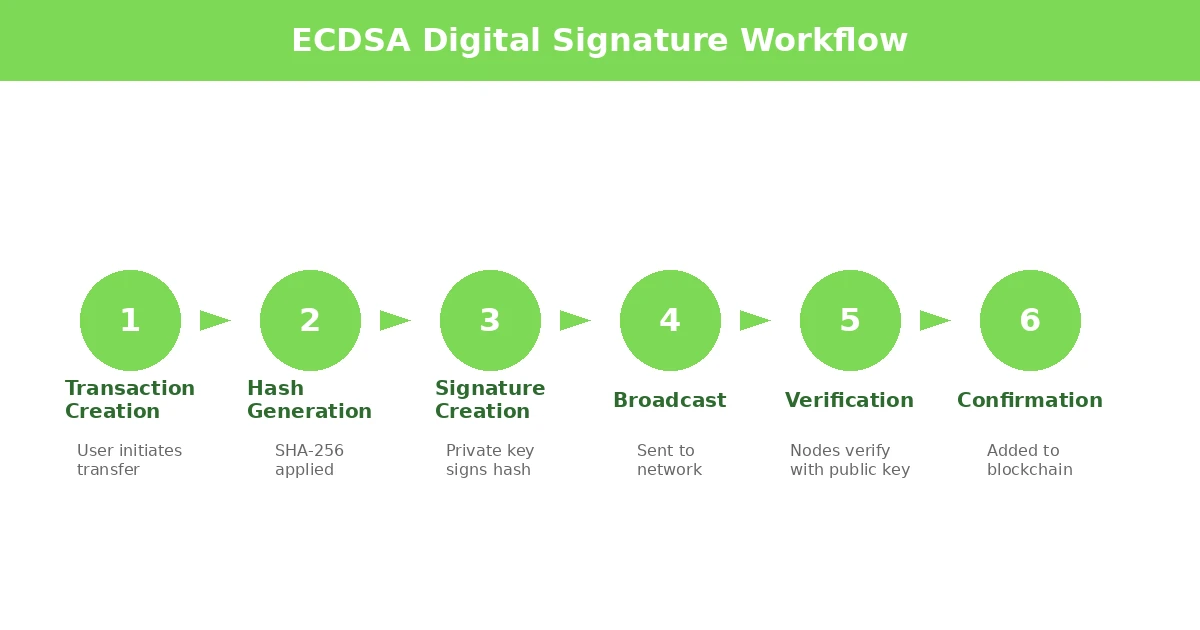Key Takeaways
- ECC provides the same level of security as RSA but with significantly shorter key lengths, making it faster and more efficient for blockchain applications.
- A 256-bit ECC key offers comparable security to a 3072-bit RSA key, reducing computational overhead by approximately 90 percent.
- Bitcoin, Ethereum, and most major cryptocurrencies rely on the secp256k1 elliptic curve for generating public and private key pairs.
- ECDSA (Elliptic Curve Digital Signature Algorithm) is the backbone of transaction verification in blockchain networks.
- ECC is particularly suited for IoT devices and mobile wallets due to its low resource requirements.
- The discrete logarithm problem makes ECC practically impossible to reverse-engineer, ensuring wallet security.
Introduction to Cryptography in Blockchain Networks
When you send Bitcoin to a friend or execute a smart contract on Ethereum, there is an invisible layer of mathematics working behind the scenes. This layer is cryptography, and specifically, it is Elliptic Curve Cryptography that keeps your digital assets safe. Without ECC, anyone could forge transactions, steal funds, or impersonate wallet owners. The entire trust model of decentralized systems would collapse.
Blockchain technology has transformed how we think about trust in digital systems. Rather than relying on banks or governments to verify transactions, blockchain networks use mathematical proofs. At the heart of these proofs sits ECC, a cryptographic system that balances security with computational efficiency. If you want to understand how blockchain technology works, grasping the fundamentals of ECC is essential.
This article breaks down ECC in plain terms. We will explore why it was chosen over older methods, how it generates the keys that protect your cryptocurrency, and what makes it so hard to crack. By the end, you will understand not just the what but the why behind this foundational blockchain technology.

What is Elliptic Curve Cryptography?
Elliptic Curve Cryptography is a public key cryptography approach based on the algebraic structure of elliptic curves over finite fields. In simpler terms, it uses the mathematical properties of specific curved lines to create encryption keys that are extremely difficult to break.
An elliptic curve is defined by an equation in the form y² = x³ + ax + b. When plotted on a graph, this equation creates a smooth, symmetric curve. The magic happens when we perform mathematical operations on points along this curve. Adding two points together always produces another point on the same curve. This property, combined with something called the discrete logarithm problem, creates the foundation for secure cryptography.
The discrete logarithm problem works like this: if you know a starting point P and multiply it by a secret number k to get another point Q, finding k when you only know P and Q is computationally infeasible. Even with the most powerful supercomputers, cracking a properly implemented ECC key would take longer than the age of the universe. According to Wikipedia’s documentation on ECC, this mathematical difficulty forms the security basis for billions of dollars in cryptocurrency transactions.
ECC vs RSA: Why Blockchain Chose Elliptic Curves
Before ECC became dominant, RSA (Rivest-Shamir-Adleman) was the standard for public key cryptography. RSA relies on the difficulty of factoring large prime numbers. While effective, RSA requires much longer keys to achieve the same security level as ECC. This difference matters enormously in blockchain systems where millions of transactions occur daily.
| Security Level (bits) | RSA Key Size | ECC Key Size | Efficiency Gain |
|---|---|---|---|
| 80 | 1024 bits | 160 bits | 6.4x smaller |
| 112 | 2048 bits | 224 bits | 9.1x smaller |
| 128 | 3072 bits | 256 bits | 12x smaller |
| 192 | 7680 bits | 384 bits | 20x smaller |
| 256 | 15360 bits | 512 bits | 30x smaller |
The table above shows why blockchain developers chose ECC. A 256-bit ECC key provides 128-bit security, which is considered secure against all known attacks including those from nation-state actors. Achieving the same security with RSA would require a 3072-bit key. The practical implications are significant: smaller keys mean faster transaction signing, reduced storage requirements, and lower bandwidth usage across the network.
When Satoshi Nakamoto designed Bitcoin, these efficiency gains were critical. Every transaction includes digital signatures, and every node on the network must verify these signatures. Using RSA would have made the network slower and more resource-intensive. ECC was the obvious choice for a system designed to scale globally.
How ECC Key Generation Works in Cryptocurrency Wallets

Understanding ECC key generation helps you appreciate why your cryptocurrency wallet is secure. The process follows a specific sequence that creates mathematically linked pairs of keys without ever exposing the private key to external systems.
The journey begins with random number generation. Your wallet software generates a random 256-bit number. This number becomes your private key. The randomness is crucial because any predictability would allow attackers to guess your key. Modern wallets use cryptographically secure random number generators that pull entropy from multiple sources including hardware noise, mouse movements, and system timing variations.
Once you have a private key (let us call it k), the wallet performs elliptic curve multiplication. It takes a predefined point on the curve called the generator point G and multiplies it by k. The result is another point on the curve, which becomes your public key. The equation is simple: Public Key = k × G. However, reversing this operation (finding k when you only know the Public Key and G) is the discrete logarithm problem we mentioned earlier. It is computationally impossible with current technology.
Your public key then undergoes hashing through SHA-256 and RIPEMD-160 algorithms. The result is your wallet address, the string of characters you share when receiving cryptocurrency. This additional hashing layer provides extra security by hiding the actual public key until you make your first transaction.
Need Secure Blockchain Development?
Nadcab Labs implements enterprise-grade ECC encryption for blockchain projects. With 8+ years of experience, we build secure wallets, smart contracts, and decentralized applications.
The secp256k1 Curve: Bitcoin’s Cryptographic Foundation
Not all elliptic curves are created equal. Bitcoin and many other cryptocurrencies use a specific curve called secp256k1. The name comes from the Standards for Efficient Cryptography (SEC) and describes the curve parameters: a 256-bit prime field with a specific generator point (k for Koblitz, and 1 indicating the first such curve).
The secp256k1 curve has parameters that were not chosen arbitrarily. The curve equation is y² = x³ + 7, which is simpler than many alternatives. This simplicity allows for optimized implementations that run faster on most hardware. The prime number defining the field is 2^256 – 2^32 – 977, which also permits efficient computation.
Interestingly, secp256k1 was not a popular choice before Bitcoin. Most cryptographic applications used curves recommended by NIST (National Institute of Standards and Technology). However, some cryptographers expressed concerns about NIST curves potentially containing backdoors. Satoshi Nakamoto chose secp256k1 because its parameters were generated in a verifiable, deterministic way, reducing suspicion of hidden vulnerabilities.
Today, the security of secp256k1 has been tested by hundreds of billions of dollars in value secured on various blockchain networks. No successful attacks against properly implemented secp256k1 have been documented. This track record provides confidence in the curve’s robustness. To trace how this technology evolved alongside blockchain, exploring the history of blockchain development offers valuable context.
ECDSA: The Digital Signature Algorithm Powering Blockchain Transactions

Elliptic Curve Digital Signature Algorithm (ECDSA) is how blockchain networks verify that transactions are authorized by the rightful owner. When you send cryptocurrency, you are not just transferring data. You are creating a mathematical proof that only someone with your private key could have generated.
The signing process works as follows. First, your wallet creates a hash of the transaction data using SHA-256. This hash is a fixed-length representation of all transaction details including recipient address, amount, and timestamp. Next, the wallet generates a random number k (different from your private key) and computes a point R = k × G on the elliptic curve. The x-coordinate of R becomes part of the signature.
Using your private key, the random number k, and the transaction hash, the wallet calculates a second value called s. The final signature consists of two numbers: r (from point R) and s. This signature is attached to your transaction and broadcast to the network.
Verification happens on every node in the network. Verifiers use your public key, the signature values (r, s), and the transaction hash to perform calculations that check mathematical relationships. If the relationships hold, the signature is valid. If anyone tampered with the transaction data or if the signature was created without the correct private key, verification fails.
ECDSA Signature Lifecycle in Blockchain Transactions
| Stage | Process | Components Used | Output |
|---|---|---|---|
| 1. Transaction Creation | User initiates transfer | Recipient, amount, fee | Unsigned transaction |
| 2. Hash Generation | SHA-256 hashing | Transaction data | 256-bit hash value |
| 3. Signature Creation | ECDSA signing | Private key, hash, random k | Signature (r, s) |
| 4. Broadcast | Network propagation | Signed transaction | Pending transaction |
| 5. Verification | ECDSA verification | Public key, signature, hash | Valid or Invalid |
| 6. Confirmation | Block inclusion | Validated transaction | Confirmed transaction |
The beauty of ECDSA lies in its asymmetry. Signing requires the private key, but verification only needs the public key. This means anyone can verify a transaction’s authenticity without gaining the ability to forge future transactions. It is a one-way street that protects users while enabling trustless verification.
Real-World Applications of ECC in Blockchain Ecosystems
ECC’s role extends far beyond simple cryptocurrency transfers. Every aspect of blockchain technology that requires authentication, encryption, or digital signatures relies on elliptic curve mathematics.
Smart contracts on Ethereum use ECC for access control. When a contract restricts certain functions to specific addresses, it is checking signatures generated through ECDSA. Decentralized finance (DeFi) protocols securing billions in locked value depend entirely on ECC for user authentication. A lending protocol like Aave or Compound trusts ECC to ensure that only the rightful owner can withdraw collateral.
Non-fungible tokens (NFTs) rely on ECC for provenance verification. When you buy an NFT, the signature chain proves ownership from the original creator to you. Each transfer is signed with ECDSA, creating an unbroken cryptographic record. Hardware wallets from companies like Ledger and Trezor perform ECC operations on secure chips, keeping private keys isolated from potentially compromised computers.
Cross-chain bridges use ECC in multi-signature schemes. Moving assets between different blockchain networks requires consensus among multiple signers. Each signer contributes a partial signature using their private key, and only when enough signatures combine does the transfer execute. This threshold cryptography builds on ECC fundamentals to distribute trust among multiple parties.
Security Considerations and Best Practices
While ECC itself is mathematically secure, implementation errors can create vulnerabilities. Understanding common attack vectors helps you protect your cryptocurrency holdings.
Random number generation is critical during signing. If the same random k value is ever used twice, attackers can compute your private key from two signatures. In 2013, this exact vulnerability led to Bitcoin theft from Android wallets that used a flawed random number generator. Always use wallets from reputable developers who follow cryptographic best practices.
Side-channel attacks target the physical implementation of ECC operations. By measuring power consumption, electromagnetic emissions, or timing variations, sophisticated attackers can sometimes extract private keys. Hardware wallets protect against these attacks through constant-time algorithms and physical shielding. For large holdings, hardware wallets are strongly recommended.
Quantum computing represents a future threat to all current public key cryptography including ECC. A sufficiently powerful quantum computer running Shor’s algorithm could solve the discrete logarithm problem in polynomial time. However, such computers do not yet exist. Researchers are developing quantum-resistant cryptographic algorithms, and blockchain networks will migrate to these systems before quantum threats materialize.
ECC Applications Across Different Blockchain Platforms
| Blockchain | Curve Used | Signature Algorithm | Key Applications |
|---|---|---|---|
| Bitcoin | secp256k1 | ECDSA, Schnorr | Transactions, multi-sig wallets |
| Ethereum | secp256k1 | ECDSA | Transactions, smart contracts |
| Solana | Ed25519 | EdDSA | High-speed transactions |
| Cardano | Ed25519 | EdDSA | Staking, governance |
| Polkadot | Sr25519 | Schnorr | Cross-chain communication |
| Hyperledger | secp256r1/secp384r1 | ECDSA | Enterprise authentication |
Why Nadcab Labs Implements ECC for Enterprise Blockchain Solutions
With over 8 years of experience in blockchain development, Nadcab Labs has implemented ECC across hundreds of projects ranging from cryptocurrency wallets to enterprise supply chain systems. This depth of experience informs every security decision we make.
Our approach to ECC implementation follows a rigorous process. We begin with threat modeling to identify specific risks for each client’s use case. A consumer wallet application faces different threats than an institutional custody solution. Based on this analysis, we select appropriate curve parameters, key derivation methods, and signature schemes.
Code review is central to our security practices. Every cryptographic implementation undergoes multiple rounds of expert review before deployment. We test against known attack vectors including timing attacks, fault injection attempts, and malformed input handling. Our testing frameworks simulate adversarial conditions that real-world attackers might employ.
Client education matters as much as technical implementation. We ensure that organizations understand not just how their blockchain system works but why specific cryptographic choices were made. This knowledge transfer helps clients maintain security as their systems evolve. When a client understands that reusing random numbers during signing could expose private keys, they make better decisions about wallet software selection and operational procedures.
Nadcab Labs stays current with cryptographic research and emerging standards. As the industry moves toward Schnorr signatures and prepares for post-quantum cryptography, we help clients plan migration paths that protect their assets while minimizing disruption. Our track record includes successful implementations for DeFi protocols, NFT marketplaces, tokenization platforms, and enterprise blockchain networks across multiple industries.
The Future of Cryptography in Blockchain Systems
ECC continues to evolve alongside blockchain technology. Several developments are shaping how cryptographic systems will work in the coming years.
Schnorr signatures offer advantages over traditional ECDSA. They enable more efficient multi-signature schemes through signature aggregation. Multiple signatures can be combined into a single signature that is the same size as an individual one. Bitcoin’s Taproot upgrade introduced Schnorr support, reducing transaction sizes and improving privacy for complex transactions.
Zero-knowledge proofs are expanding what cryptography can accomplish. These proofs allow one party to demonstrate knowledge of information without revealing the information itself. Combined with elliptic curve techniques, zero-knowledge proofs enable privacy-preserving transactions on public blockchains. Projects like Zcash and protocols like zkSync use these advanced cryptographic methods.
Post-quantum cryptography research is accelerating. Organizations like NIST are standardizing quantum-resistant algorithms that will eventually replace or supplement ECC. The blockchain industry is preparing for this transition. Some projects are already implementing hybrid schemes that combine traditional ECC with quantum-resistant algorithms, ensuring security regardless of when practical quantum computers emerge.
Ready to Implement ECC-Based Security?
Our cryptography experts at Nadcab Labs design and build secure blockchain systems. From wallet development to enterprise integration, we deliver battle-tested solutions.
Conclusion
Elliptic Curve Cryptography is the mathematical foundation that makes blockchain technology trustworthy. By providing strong security with efficient key sizes, ECC enables the fast, scalable transaction processing that modern blockchain networks require. From Bitcoin’s secp256k1 curve to Ethereum’s smart contract signatures, ECC protects trillions of dollars in digital assets.
Understanding ECC helps you make informed decisions about cryptocurrency security. Knowing why private keys must remain secret, how digital signatures prove ownership, and what makes certain implementations more secure than others transforms you from a passive user into an informed participant in the decentralized economy.
As blockchain technology continues maturing, cryptographic methods will evolve. Schnorr signatures are already improving efficiency. Zero-knowledge proofs are enhancing privacy. Quantum-resistant algorithms are preparing for future threats. Through all these changes, the fundamental principles of elliptic curve mathematics will remain relevant, providing the security guarantees that trustless systems demand.
Frequently Asked Questions
ECC achieves equivalent security levels to RSA using significantly shorter keys. A 256-bit ECC key provides the same protection as a 3072-bit RSA key. This smaller key size results from the mathematical difficulty of the elliptic curve discrete logarithm problem, which is harder to solve than RSA’s integer factorization problem. For blockchain networks processing millions of transactions, this efficiency translates to faster signing operations, reduced storage requirements, and lower bandwidth consumption across distributed nodes.
ECDSA creates a unique digital signature for each transaction using your private key. This signature mathematically proves you authorized the transfer without revealing your private key. Network nodes verify signatures using your public key, which anyone can access. The discrete logarithm problem ensures that attackers cannot derive your private key from signatures or public information. Without your private key, forging valid signatures is computationally impossible with current technology.
Satoshi Nakamoto selected secp256k1 because its parameters were generated through a transparent, deterministic process rather than chosen arbitrarily. Some cryptographers raised concerns about potential backdoors in NIST curves. The secp256k1 curve uses the simple equation y² = x³ + 7 with a verifiable prime field, allowing independent verification of security properties. This transparency aligns with blockchain’s trustless philosophy where mathematical verification replaces institutional trust.
Theoretical quantum computers running Shor’s algorithm could solve the discrete logarithm problem, breaking ECC security. However, such computers do not currently exist and likely will not for years. The blockchain industry is actively preparing through post-quantum cryptography research. NIST is standardizing quantum-resistant algorithms, and some projects already implement hybrid cryptographic schemes combining ECC with quantum-resistant methods to ensure long-term security during the transition period.
Losing your private key means permanent loss of access to associated funds because ECC’s security prevents key recovery from public information. If compromised, attackers can sign transactions as you, potentially draining your wallet. This is why secure key storage practices are essential: use hardware wallets, create encrypted backups, employ seed phrases following BIP-39 standards, and never store private keys in plain text. Multi-signature wallets distribute risk across multiple keys.
Hardware wallets perform all ECC operations including key generation and transaction signing on isolated secure chips. Private keys never leave the device, protecting against malware, keyloggers, and remote attacks targeting computer systems. These devices implement constant-time algorithms and physical shielding to resist side-channel attacks that exploit timing variations or electromagnetic emissions. For significant cryptocurrency holdings, hardware wallets represent the security standard recommended by cryptography experts.
Reviewed & Edited By

Aman Vaths
Founder of Nadcab Labs
Aman Vaths is the Founder & CTO of Nadcab Labs, a global digital engineering company delivering enterprise-grade solutions across AI, Web3, Blockchain, Big Data, Cloud, Cybersecurity, and Modern Application Development. With deep technical leadership and product innovation experience, Aman has positioned Nadcab Labs as one of the most advanced engineering companies driving the next era of intelligent, secure, and scalable software systems. Under his leadership, Nadcab Labs has built 2,000+ global projects across sectors including fintech, banking, healthcare, real estate, logistics, gaming, manufacturing, and next-generation DePIN networks. Aman’s strength lies in architecting high-performance systems, end-to-end platform engineering, and designing enterprise solutions that operate at global scale.






